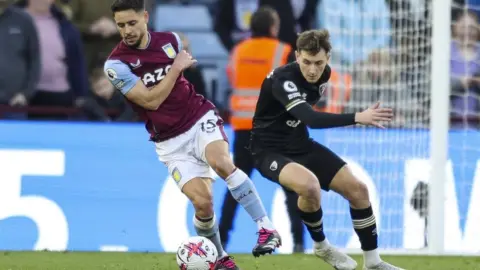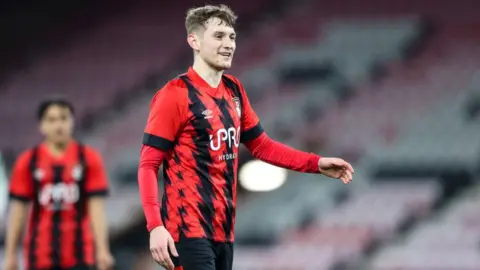David Brooks says paracetamol request led to cancer diagnosis
 Getty Images
Getty ImagesPremier League footballer David Brooks has said a request for paracetamol from a Wales team doctor led to him being diagnosed with Hodgkin lymphoma.
The AFC Bournemouth midfielder said his club noticed deteriorating performances for several weeks before the diagnosis in October 2021.
He said the Welsh doctor ordered cancer tests after hearing about his sudden weight loss and night sweats.
Brooks said he was overjoyed to get the all clear after 18 months of treatment.
In an interview on the club website, Brooks recalled meetings with former AFC Bournemouth manager Scott Parker.
The footballer said: "He was showing me numbers. I was just kind of lagging behind.
"I was always one of the lower ones in terms of distance covered or sprints. It carried on for probably one or two months."
'Struggling to sleep'
The midfielder said he suffered a severe drop in weight, losing 6-7kg (13-15lb) in two weeks, and was also kept awake by night sweats.
He added: "Then I went away with Wales and they do the medical checks at the start.
"I just kind of asked for paracetamol and said: 'I'm struggling to sleep.'
"I had that conversation with the doc and went back to my room as if nothing had happened.
"And then I just got a knock on the door 20 minutes later. He obviously didn't want to do it in front of the lads.
"He said: 'I don't want to alarm you but everything you've told us is a side effect of cancer.'
"You don't really believe it when he says the word. Obviously you have a bit of a cry and hope that everything's going to be alright."
 Robin Jones / AFC Bournemouth /Getty Images
Robin Jones / AFC Bournemouth /Getty ImagesBrooks was diagnosed with Stage 2 Hodgkin lymphoma, requiring fortnightly chemotherapy which left him "barely able to get out of bed".
He was given the all clear in May 2022 and has twice appeared for AFC Bournemouth's first team as a substitute since March.
"Just trying to get fit and play as many games as possible is the aim now," he said.
"I think it's probably mellowed me a little bit. You realise that football has been my life for 24 years before I got diagnosed and it all meant nothing in a brief moment."

Follow BBC South on Facebook, Twitter, or Instagram. Send your story ideas to [email protected].
